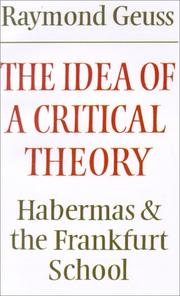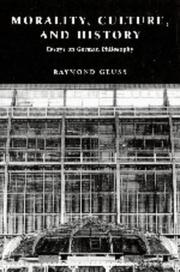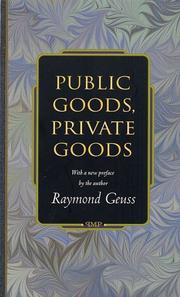| Listing 1 - 10 of 27 | << page >> |
Sort by
|
Book
ISBN: 9780691137889 0691137889 0691258694 1299051111 1400835518 Year: 2008 Publisher: Princeton, N.J. Princeton University Press
Abstract | Keywords | Export | Availability | Bookmark
 Loading...
Loading...Choose an application
- Reference Manager
- EndNote
- RefWorks (Direct export to RefWorks)
Many contemporary political thinkers are gripped by the belief that their task is to develop an ideal theory of rights or justice for guiding and judging political actions. But in Philosophy and Real Politics, Raymond Geuss argues that philosophers should first try to understand why real political actors behave as they actually do. Far from being applied ethics, politics is a skill that allows people to survive and pursue their goals. To understand politics is to understand the powers, motives, and concepts that people have and that shape how they deal with the problems they face in their particular historical situations. Philosophy and Real Politics both outlines a historically oriented, realistic political philosophy and criticizes liberal political philosophies based on abstract conceptions of rights and justice. The book is a trenchant critique of established ways of thought and a provocative call for change.
Political science --- Philosophy. --- Political philosophy. Social philosophy --- Science politique --- Philosophie --- Political philosophy --- Philosophy
Book
ISBN: 9780691142272 0691142270 9780691142289 0691142289 128245871X 1400832136 9786612458712 Year: 2010 Publisher: Princeton, NJ : Princeton University Press,
Abstract | Keywords | Export | Availability | Bookmark
 Loading...
Loading...Choose an application
- Reference Manager
- EndNote
- RefWorks (Direct export to RefWorks)
In politics, utopians do not have a monopoly on imagination. Even the most conservative defenses of the status quo, Raymond Geuss argues, require imaginative acts of some kind. In this collection of recent essays, including his most overtly political writing yet, Geuss explores the role of imagination in politics, particularly how imaginative constructs interact with political reality. He uses decisions about the war in Iraq to explore the peculiar ways in which politicians can be deluded and citizens can misunderstand their leaders. He also examines critically what he sees as one of the most serious delusions of western political thinking--the idea that a human society is always best conceived as a closed system obeying fixed rules. And, in essays on Don Quixote, museums, Celan's poetry, Heidegger's brother Fritz, Richard Rorty, and bourgeois philosophy, Geuss reflects on how cultural artifacts can lead us to embrace or reject conventional assumptions about the world. While paying particular attention to the relative political roles played by rule-following, utilitarian calculations of interest, and aspirations to lead a collective life of a certain kind, Geuss discusses a wide range of related issues, including the distance critics need from their political systems, the extent to which history can enlighten politics, and the possibility of utopian thinking in a world in which action retains its urgency.

ISBN: 0521240727 Year: 1981 Publisher: Cambridge
Abstract | Keywords | Export | Availability | Bookmark
 Loading...
Loading...Choose an application
- Reference Manager
- EndNote
- RefWorks (Direct export to RefWorks)
Critical theory --- Frankfurt school of sociology --- #SBIB:316.21H21 --- Critical theory (Sociology) --- Frankfurt school --- Frankfurt sociologists --- Schools of sociology --- Marxian school of sociology --- Critical social theory --- Critical theory (Philosophy) --- Negative philosophy --- Criticism (Philosophy) --- Philosophy, Modern --- Rationalism --- Sociology --- Socialism --- Theoretische sociologie: kritische theorie en de Frankfurter Schule --- Habermas, Jürgen. --- Habermas, Jürgen --- Habŏmasŭ, Wirŭgen --- Habŏmasŭ --- Khabermas, I︠U︡. --- Khabermas, I︠U︡rgen --- Ha-pei-ma-ssu, Yu-erh-ken --- Habeimasi --- הברמאס, יורגן --- יורגן הברמס --- 哈贝马斯 --- Theory of knowledge --- Sociological theories --- Habermas, Jürgen --- Frankfurt am Main

ISBN: 0521635683 Year: 1999 Publisher: Cambridge Cambridge University Press
Abstract | Keywords | Export | Availability | Bookmark
 Loading...
Loading...Choose an application
- Reference Manager
- EndNote
- RefWorks (Direct export to RefWorks)
Philosophy, German --- History of philosophy --- anno 1800-1999 --- Germany
Book
ISBN: 9780674504950 Year: 2016 Publisher: Cambridge, Mass. Harvard University Press
Abstract | Keywords | Export | Availability | Bookmark
 Loading...
Loading...Choose an application
- Reference Manager
- EndNote
- RefWorks (Direct export to RefWorks)
Book
ISBN: 9780674245938 Year: 2020 Publisher: Cambridge Harvard University Press
Abstract | Keywords | Export | Availability | Bookmark
 Loading...
Loading...Choose an application
- Reference Manager
- EndNote
- RefWorks (Direct export to RefWorks)
Political philosophy. Social philosophy --- Theory of knowledge --- Religious studies
Multi
ISBN: 9780674247222 9780674245938 Year: 2020 Publisher: Cambridge, Mass. Harvard University Press
Abstract | Keywords | Export | Availability | Bookmark
 Loading...
Loading...Choose an application
- Reference Manager
- EndNote
- RefWorks (Direct export to RefWorks)
Philosophy --- Political philosophy. Social philosophy --- Theory of knowledge --- Religious studies
Multi
ISBN: 9780674968936 Year: 2016 Publisher: Cambridge, Mass. Harvard University Press
Abstract | Keywords | Export | Availability | Bookmark
 Loading...
Loading...Choose an application
- Reference Manager
- EndNote
- RefWorks (Direct export to RefWorks)
Multi
ISBN: 9780674981980 Year: 2018 Publisher: Cambridge, Mass. Harvard University Press
Abstract | Keywords | Export | Availability | Bookmark
 Loading...
Loading...Choose an application
- Reference Manager
- EndNote
- RefWorks (Direct export to RefWorks)

ISBN: 9781400824823 9780691117201 Year: 2009 Publisher: Princeton, N.J. Princeton University Press
Abstract | Keywords | Export | Availability | Bookmark
 Loading...
Loading...Choose an application
- Reference Manager
- EndNote
- RefWorks (Direct export to RefWorks)
| Listing 1 - 10 of 27 | << page >> |
Sort by
|

 Search
Search Feedback
Feedback About UniCat
About UniCat  Help
Help News
News